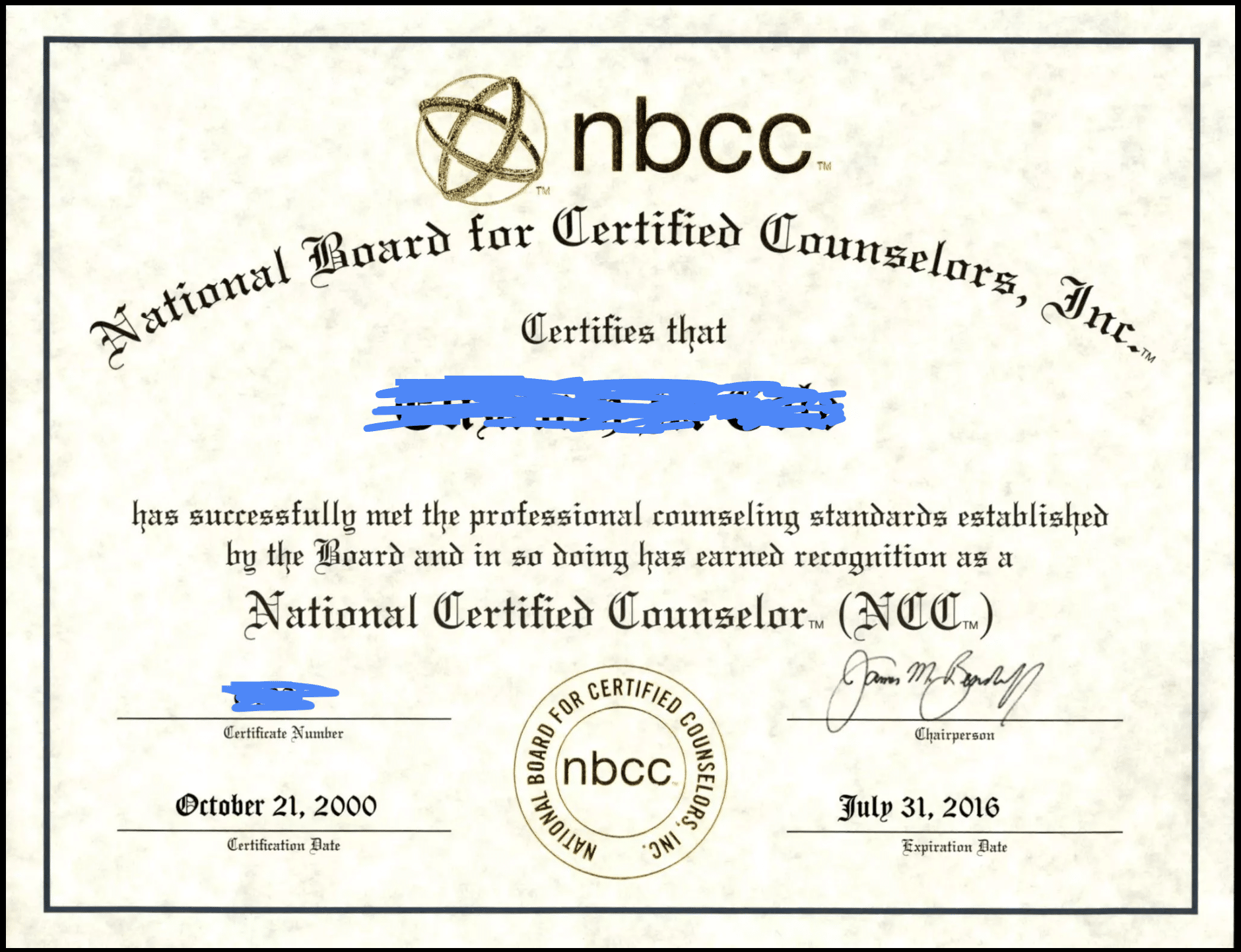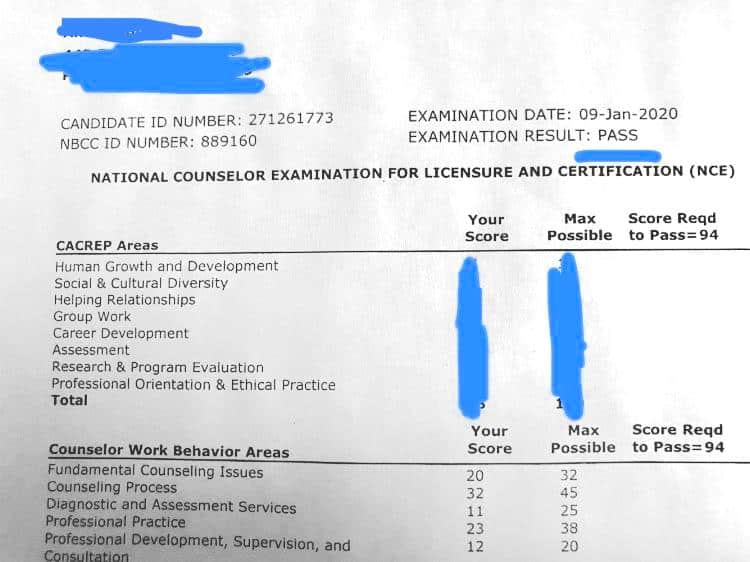
The National Counselor Examination (NCE) is an essential step in your journey towards a career in counseling, administered by the National Board for Certified Counselors (NBCC). Originating in 1983, this exam continues to evolve to reflect the current trends in the counseling profession.
The NCE is designed to test your knowledge in six key domains:
The content aligns with the eight original content areas of the Council for Accreditation of Counseling and Related Educational Programs (CACREP) and six work behaviors validated from a job analysis.
The National Counselor Examination (NCE) is a 200-question multiple-choice assessment managed by the National Board for Certified Counselors (NBCC), with 160 scored items determining your pass or fail. An impressive 84% of test-takers pass, reflecting a high level of proficiency, and your score is solely based on your exam performance, not past experience or external variables. You’re granted three attempts to pass before needing to reapply, and if successful, your scores remain valid for five years before needing to retake the NCE.
The NCE comprises 200 multiple-choice questions, of which 160 are scored. The remainder are field-test items used for future exam statistics. The exam is administered twice a year, in April and October, and you must first apply for certification to register.
On the exam day, you need two forms of valid ID. Your score is solely determined by your exam performance, and a passing score is established by subject matter experts. If you don’t pass, you can retake the exam up to three times.
Understanding the exam’s structure and the six key domains is a solid start to your preparation.
Question types explained
Results scale & interpretations
Frequently asked questions
As you prepare for your upcoming examination, it’s important to understand the key areas that will be covered. The test will assess your knowledge, skills, and abilities across six main domains: Professional Practice and Ethics, Intake, Assessment, and Diagnosis, Areas of Clinical Focus, Treatment Planning, Counseling Skills and Interventions, and Core Counseling Attributes.
The table below provides a detailed breakdown of the six domains (work behaviors) that will be assessed in the examination. Each domain is represented with the percentage and number of scored items on the test.

The NCE Test, or National Counselor Examination, is also commonly referred to as:
However, it’s important to note that the official name is the National Counselor Examination. Other names are typically variations or abbreviations used informally.
To register for the National Counselor Examination (NCE), follow these steps:
Please note that all online payments for the NCC application, including examination fees, must be made by credit card (VISA, MasterCard, or American Express) and are not refundable or transferable.
To qualify for the NCE, you must have a graduate-level degree or higher from a counseling program accredited by CACREP or administered by an institutionally accredited college or university. Your counseling degree program should contain courses in the following eight requirement areas:
The NCE is a 200-question, multiple-choice examination. It is not sectioned, and you will have a total test session of 255 minutes (4 hours and 15 minutes) to complete it. Here’s how the time is broken down:
The NCE covers eight CACREP domains:
Each version of the NCE contains different questions, but the content areas and the respective numbers of questions representing those areas are consistent. Out of the 200 questions, 160 are scored, and each of these contributes one score point. The maximum possible score you can achieve is 160. The remaining 40 items are unscored field-test items, included to gather statistics for future examinations.
Navigating the intricacies of the National Counselor Examination (NCE) can seem daunting, but having a solid understanding of the scoring system and its interpretation can significantly aid your preparation.
Firstly, it’s crucial to know that the NCE doesn’t have a universally known passing score. The passing range varies depending on the form of the exam, and it usually lies between 56% and 67%. This information isn’t published ahead of time, but most test-takers who score between 58% and 70% on full-length practice exams reportedly pass the actual test.
The NCE consists of 200 questions, 160 of which are scored. The remaining 40 are known as “Item Analysis” questions, which are not scored and are used to test questions for possible use in upcoming exams. If you answer an Item Analysis question correctly, it will be marked as incorrect to ensure it doesn’t contribute to your final score. Your total score is calculated based on the number of correct answers out of 160.
Your score report will provide a breakdown of your performance in six specific work domains:
Each domain corresponds to a certain percentage of scored items on the exam. For instance, “Professional Practice and Ethics” and “Intake, Assessment, and Diagnosis” each make up 12% of the exam, equating to 19 scored items each. The largest domain is “Counseling Skills and Interventions,” which represents 30% of the exam or 48 scored items.
Each domain assesses different areas of a counselor’s knowledge and skills. For example, “Professional Practice and Ethics” gauges understanding of administrative and clinical protocols, while “Intake, Assessment, and Diagnosis” evaluates the ability to conduct client intake, assessment, and diagnosis. “Counseling Skills and Interventions” focuses on a counselor’s ability to apply specific techniques to facilitate client change, and “Core Counseling Attributes” assesses core qualities such as warmth, respect, empathy, and genuineness.

The NCE also aligns with the eight CACREP (Council for Accreditation of Counseling and Related Educational Programs) curriculum educational standards, including Professional Counseling Orientation and Ethical Practice, Social and Cultural Diversity, Human Growth and Development, and more.
Please note that while this information provides a good overview of the scoring and interpretation of the NCE, there may be additional nuances or changes that aren’t covered here, as the exam can vary. It’s always a good idea to refer to the most recent materials and guides provided by the National Board for Certified Counselors (NBCC) and the Center for Credentialing & Education (CCE) for the most accurate and up-to-date information.
iPREP: Concise. Focused. What you need.